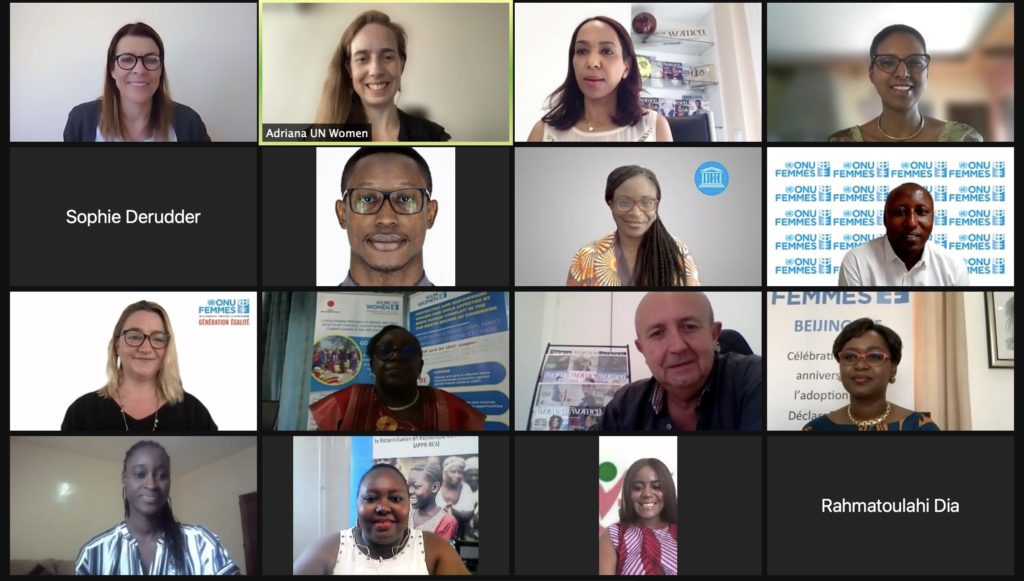Lundi 31 mai, ONU Femmes Afrique a organisé une visioconférence de grande qualité sur la thématique « Femmes, Droits Humains et Sport ». Women Sports Africa, partenaire de l’événement, a participé aux débats riches et engageants. Voici le replay vidéo et quelques verbatims issus de cette table ronde.
L’objectif de cette table ronde était de créer un cadre d’échange entre les professionnels du sport et autres parties prenantes pour une conversation franche sur les défis que rencontres les femmes et les jeunes filles africaines dans sport à tous les niveaux, et échanger sur les actions à mettre en place pour braver les stéréotypes de genre et les normes sociales qui empêchent les femmes de pratiquer le sport.
Voici le replay intégral :
Extraits :
Oulimata Sarr, Directrice régionale d’ONU Femmes Afrique de l’Ouest et du Centre : « Le sport joue un rôle primordial pour développer les compétences de leadership des adolescentes et créer des espaces sûrs pour les filles afin de briser les barrières sociales. »
Bruno Lalande, Women Sports Africa : « Médiatiser les actions portées par des instances telles qu’ONU Femmes à travers le sport est la raison d’être de Women Sports et Women Sports Africa. C’est notre ADN. »
Victorine Agum, Top athlete and Deputy Director of the Training Centre of the National Football Academy, Cameroun : « Told her story of overcoming many challenges (financial, stigma, lack of sport equipment) and face parental disapproval before starting an impressive carrer as a competitor and coach in 10 different sports. Among her proposition to improve the condition of women and girls in sport is creating specific competitions for women and girls, ensure media coverage, encourage government to create protection law for women in sport, use international events like CAN to sensitize the public. I was called a tomboy and told I was a mockery in the community, but my passion for sport was stronger. »
Olive Michele Dol-Somse, former footballer, currently serving as the chairperson of the women’s football Board at the Central African football Federation, CAR : « La pratique du football au féminin en RCA a commencé en 1981 avec 8 équipes à Bangui et aujourd’hui il y a plus de 800 joueuses. Le sport est un outil de développement social à travers l’épanouissement des femmes et des filles. La valorisation du sport féminin passe par politique, promotion auprès des femmes , en le rendant attrayant pour le grand public et par le financement pour améliorer les conditions des joueuses. À Bangui, en RCA, il faut une professionnalisation du sport en Afrique. les fédérations doivent proposer des plans de carrières pour les jeunes filles. À Bangui, nous avons choisi de jouer le championnat sur des terrains dans différentes parties de la ville, au lieu du grand stade. Cela permet d’attirer plus de public et de toucher beaucoup de jeunes filles, et susciter en elles l’envie de s’intéresser au sport.
Fatou Ndiaye, Ancienne Basketteuse de la NBA, Coordonnatrice de SEED/NBA Academie pour les flles, Senegal : « I started basketball at the age of 16. My brother was playing basketball but got injured. My dad did not allow me to play until I got my high school diploma. He was worried about what people would think of my sports practice and me being seen as a boy more than a woman. I was one of the first women of the SEED program to get a scholarship to play and study abroad. First my dad did not allow me. But I have been the first one to go to university and first one to enter the national team. Coaches need to talk more with parents, to share with the families what the team is doing, and ask kids to perform well academically too. Then parents and coach can work together; otherwise they would not trust the coaches and allow their kids to practice sport. I want to play basketball because I want people to change the way people think about women in general. And be a leader for the next generation. I don’t believe that only men can play basketball. I want to have the kids behind me. It takes time and discipline to have a sport’s career. »
Aderonke Bello, Special Adviser to the Minister of State for the Federal Capital Territory in Nigeria and is the Chief Executive Officer (CEO) of Female Advocacy, Mentoring and Empowerment (FAME) Foundation : « Sport is very important in making changes in society. Most of the time local authorities lack access to information, finances, and structures to allow girls play sports Sport is very effective to change mentalities on child marriage, for example. Girls can do sport everywhere, you don’t need the modern equipment or be a professional, You can do it now, everywhere. Just start. We need to create awareness around women’s sports that a girl who is doing sport is not a boy, she is not masculine, she is a woman, that can be whatever and whoever she wants to be. Media can do it because they can change people’s mindsets. »
